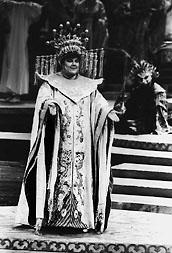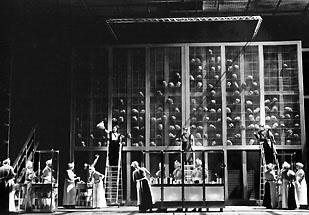Puccini:
Turandot
R. Strauss: Ariadne auf
Naxos
Massenet: Manon
Metropolitan
Opera, New York
 Impossible to get a ticket for
the Pavarotti-Eaglen Turandot. This week the Zeffirelli production
served as a back drop for a futile exercise in Pavarotti-worship.
Pavarotti's long-awaited Calaf was apathetic and self-indulgent. He
was obviously bored, barely moved except to sit down and he
constantly turned his back to the audience to pop throat lozenges.
He hardly looked at Eaglen during the whole opera and refused to
kiss her in the final scene. Vocally he was frankly average. Yes, we
heard the trademark Pavarotti timbre, but he shortened phrases and
shied from high notes as if he was just marking at a rehearsal. And
the crowd went wild. I don't know why Pavarotti undertakes such
roles at his age. Lord knows he doesn't need the money. In the final
analysis the real losers are the many true opera lovers shut out of
the Met whenever Pavarotti turns the place into an expensive and
exclusive circus. By far the most artistically satisfying performer
was Hei-Kyung Hong as Li¨. Her acting was impassioned and her
singing, complete with soft-spun pianissimi, was simply superb.
Brava. Jane Eaglen's Turandot was more feminine and delicate than
many recent Turandots (think of marmoreal Dame Gwyneth Jones,
granitic Ghena Dimitrova, glacial Audrey Stottler). Eaglen didn't
affright us with hair-raising high notes, wobbling or shrieking. Her
gestures and facial expressions were communicative, she was quite
mobile, and her instrument was sweet and steady. She is obviously a
serious and sensitive artist. (Canadian audiences will get to see
her live at the NAC in Ottawa on January 14, 1998, at 8 p.m.) Impossible to get a ticket for
the Pavarotti-Eaglen Turandot. This week the Zeffirelli production
served as a back drop for a futile exercise in Pavarotti-worship.
Pavarotti's long-awaited Calaf was apathetic and self-indulgent. He
was obviously bored, barely moved except to sit down and he
constantly turned his back to the audience to pop throat lozenges.
He hardly looked at Eaglen during the whole opera and refused to
kiss her in the final scene. Vocally he was frankly average. Yes, we
heard the trademark Pavarotti timbre, but he shortened phrases and
shied from high notes as if he was just marking at a rehearsal. And
the crowd went wild. I don't know why Pavarotti undertakes such
roles at his age. Lord knows he doesn't need the money. In the final
analysis the real losers are the many true opera lovers shut out of
the Met whenever Pavarotti turns the place into an expensive and
exclusive circus. By far the most artistically satisfying performer
was Hei-Kyung Hong as Li¨. Her acting was impassioned and her
singing, complete with soft-spun pianissimi, was simply superb.
Brava. Jane Eaglen's Turandot was more feminine and delicate than
many recent Turandots (think of marmoreal Dame Gwyneth Jones,
granitic Ghena Dimitrova, glacial Audrey Stottler). Eaglen didn't
affright us with hair-raising high notes, wobbling or shrieking. Her
gestures and facial expressions were communicative, she was quite
mobile, and her instrument was sweet and steady. She is obviously a
serious and sensitive artist. (Canadian audiences will get to see
her live at the NAC in Ottawa on January 14, 1998, at 8 p.m.)
Equally impossible to get a ticket for the Met's Carmen,
again without visible or audible reason. Domingo and Graves have
done JosÚ and Carmen at the Met before, and better. Graves is still
voluptous and vocally bewitching, but her gypsy has become a
caricature of what it formerly was: please, we don't need another
sleazy Carmen. Domingo was not in good voice, the flower song was
hoarse and he failed to hold the high notes. Norah Ansellem's
Micaela was sweet but mannered, and she has a bad habit of twitching
her head. Gino Quilico is a sexier and smoother-acting Escamillo
than Lieferkus, but his voice was in a constant state of unreliable
flux. Conductor Yves Abel had his work cut out for him trying to
unify these unruly elements. Fortunately the Met orchestra can
play Carmen in their sleep, which explains the impression
that everyone was playing on automatic pilot. The Met's other French
offering was Massenet's Manon, a vehicle for America's
soprano sweetheart RenÚe Fleming. Last year I enjoyed Fleming's
Rusalka immensely,  but I was not really convinced by her Manon. It looked good
on paper, but in person Fleming is too much of an American Earth
Mother to play the teenage French flirt. Her coloratura was
technically acceptable, but her voice is too cool and heavy for this
flimsy part. Though her Paris Manon was well-received there, her
pronunciation of French vowel sounds is not perfect. Marcello
Giordani's des Grieux was very strong and admirable. Unfortunately
the entire cast overacted their parts with an exaggerated and
juvenile misunderstanding of French character that ruined the whole
opera for me. Only veteran Michel SÚnÚchal was true to life, but no
one took his cue. The sets were cheaply painted flats, and Julius
Rudel seems to have forgotten how to make Massenet interesting in
the thirty years since he did it so well with Beverly Sills. Tickets
were easy to get for Ariadne auf Naxos, and it turned out to be
the best show of the week. The 1993 Moshinsky-Yeargan production
offers a realistically cluttered Prologue and a gorgeous, ethereal
setting for the Perfomance. Susanne Mentzer's Composer was
passionate but a bit lacking at both ends of her range, while Heinz
Zednik's Dancing Master was charismatic, rich-voiced and amusing.
Nico Castel's Major-Domo was vulgar and awkward, with slurred
pronunciation. The Lackey was far more aristocratic. Thomas Moser
displayed good phrasing and middle voice as Bacchus, but his top
notes were strained. Najade, Dryade and Echo appeared atop 20-foot
high ball gowns and sang ravishingly, each of them of solo quality.
Deborah Voigt's Prima Donna/Ariadne is vocally irreproachable, and
her aria was riveting, but she should be more haughty. French
soprano Nathalie Dessay blatantly stole the show as Zerbinetta.
Though Dessay has vocal limitations they count as nothing compared
to her spunky, utterly charming acting. Dessay's recordings give no
idea of her delightful presence and enchanting singing. She
establishes an immediate, intense rapport with the audience, and you
just can't take your eyes off her. Her big aria literally stopped
the show for minutes of frenzied clapping. Even Maestro Levine
clapped, a rare honour, but one Dessay deserved. I will never again
miss a chance to hear this wonderful artist perform. but I was not really convinced by her Manon. It looked good
on paper, but in person Fleming is too much of an American Earth
Mother to play the teenage French flirt. Her coloratura was
technically acceptable, but her voice is too cool and heavy for this
flimsy part. Though her Paris Manon was well-received there, her
pronunciation of French vowel sounds is not perfect. Marcello
Giordani's des Grieux was very strong and admirable. Unfortunately
the entire cast overacted their parts with an exaggerated and
juvenile misunderstanding of French character that ruined the whole
opera for me. Only veteran Michel SÚnÚchal was true to life, but no
one took his cue. The sets were cheaply painted flats, and Julius
Rudel seems to have forgotten how to make Massenet interesting in
the thirty years since he did it so well with Beverly Sills. Tickets
were easy to get for Ariadne auf Naxos, and it turned out to be
the best show of the week. The 1993 Moshinsky-Yeargan production
offers a realistically cluttered Prologue and a gorgeous, ethereal
setting for the Perfomance. Susanne Mentzer's Composer was
passionate but a bit lacking at both ends of her range, while Heinz
Zednik's Dancing Master was charismatic, rich-voiced and amusing.
Nico Castel's Major-Domo was vulgar and awkward, with slurred
pronunciation. The Lackey was far more aristocratic. Thomas Moser
displayed good phrasing and middle voice as Bacchus, but his top
notes were strained. Najade, Dryade and Echo appeared atop 20-foot
high ball gowns and sang ravishingly, each of them of solo quality.
Deborah Voigt's Prima Donna/Ariadne is vocally irreproachable, and
her aria was riveting, but she should be more haughty. French
soprano Nathalie Dessay blatantly stole the show as Zerbinetta.
Though Dessay has vocal limitations they count as nothing compared
to her spunky, utterly charming acting. Dessay's recordings give no
idea of her delightful presence and enchanting singing. She
establishes an immediate, intense rapport with the audience, and you
just can't take your eyes off her. Her big aria literally stopped
the show for minutes of frenzied clapping. Even Maestro Levine
clapped, a rare honour, but one Dessay deserved. I will never again
miss a chance to hear this wonderful artist perform.
Philip
Anson |


